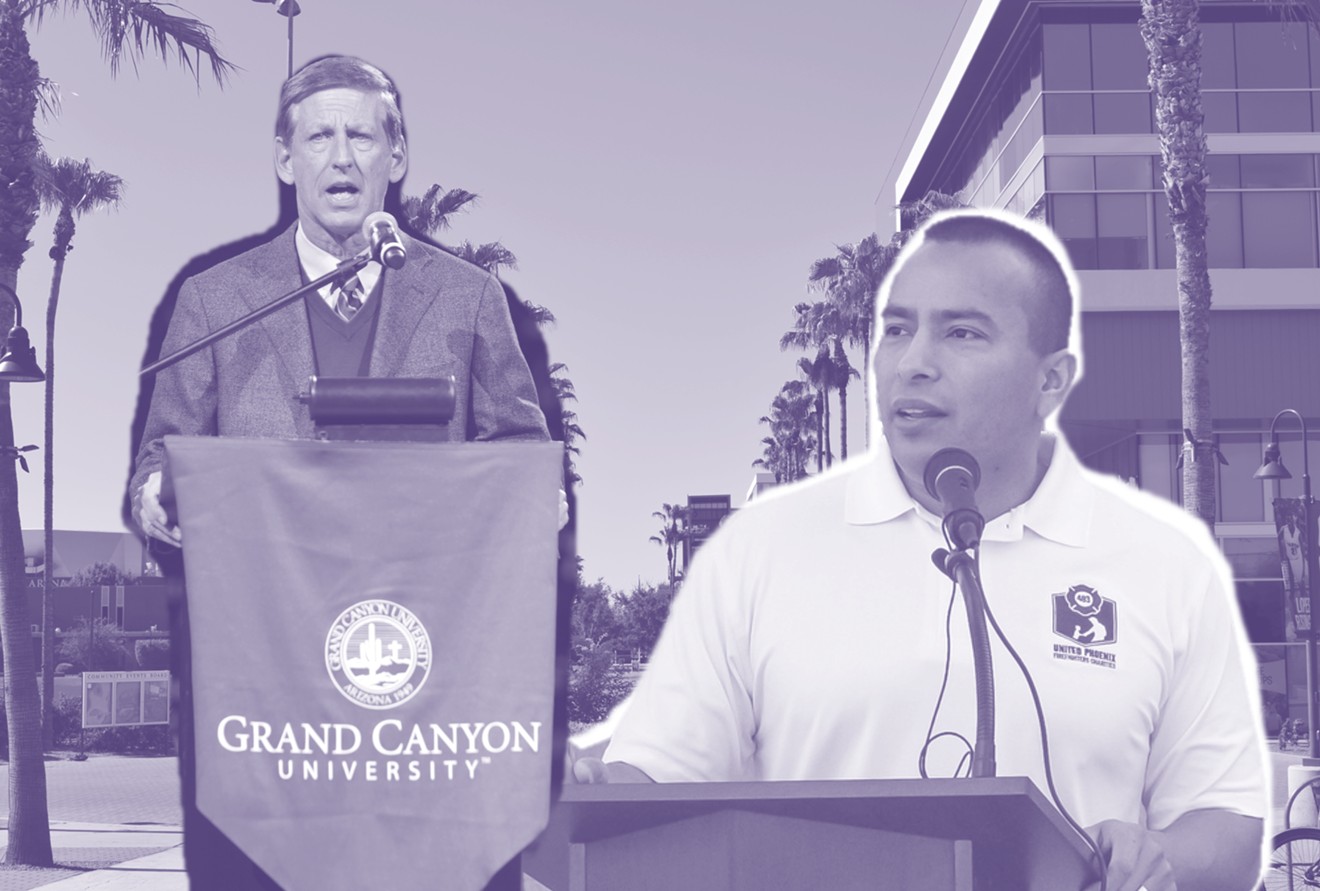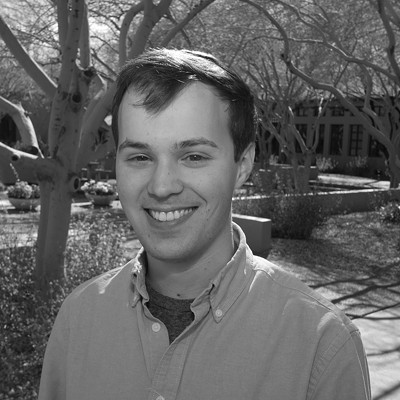When Grand Canyon University's president recently announced that the university had converted to a nonprofit, he invited Phoenix City Councilman Daniel Valenzuela on stage.
GCU President and CEO Brian Mueller introduced Valenzuela as "a great partner and somebody who I believe is going to be the future mayor of the city of Phoenix."
"I'm a big supporter. I will always be a supporter," Valenzuela said to the crowd. "Because look around – how could you not?"
The support goes both ways. GCU executives are committed financial backers of Valenzuela's campaign for mayor, though neither Mueller nor Valenzuela mentioned it in their speeches. Valenzuela has received thousands of dollars in campaign contributions from executives and leaders of Grand Canyon University during his race for mayor.
And although Valenzuela hailed GCU's conversion – "It has to feel good to return back to the original state of being a nonprofit university" – he never mentioned that Phoenix is poised to lose millions of dollars in property tax revenue in the coming years because of GCU's legal maneuver.
The donations highlight the close relationship between Valenzuela and GCU, until recently a for-profit operator based in west Phoenix. Since 2012, Valenzuela has represented District 5 on the Council, which includes the GCU campus and its surroundings.
According to the latest campaign finance filings, as of June 30, Valenzuela has raised at least $7,900 from individuals who listed GCU as their employer. They include Mueller and many other members of the company's executive suite.
Additionally, Grand Canyon University has donated $8,350 to Valenzuela's campaign since August 2017 through its political action committee, including a $2,000 donation last month.
GCU has approximately 21,000 students on its ground campus and 70,000 enrolled in online courses. On July 1, however, GCU executed a long-sought conversion that split the company into a nonprofit university and a for-profit service provider.
The unprecedented conversion allows the university to avoid millions of dollars in property taxes on the 275-acre ground campus and the additional regulatory scrutiny applied to for-profit operators. Mueller will remain the president of GCU and CEO of the company, Grand Canyon Education, Inc., (GCE) which is publicly traded.
A long list of GCU leaders have donated to Valenzuela's committee. Many of them contributed in December.
Mueller donated $750 directly to Valenzuela that month. He has also chipped in $2,500 to GCU's PAC so far this year, according to a Federal Election Commission filing.
GCU general counsel Brian Roberts donated $1,000 in December; his total contributions to Valenzuela's committee this election cycle add up to $1,250.
Daniel Bachus, the CFO of Grand Canyon Education, Inc., has donated $1,000 since last summer. William 'Stan' Meyer, the COO of GCE, also donated $1,000. Joseph Mildenhall, the CIO, has given $1,500 since last summer.
Other academic and administrative leaders donated in smaller amounts: vice president of institutional effectiveness Antoinette Farmer-Thompson ($250), Colangelo College of Business Dean Randy Gibb ($100), university relations officer Faith Weese ($350), human resources vice president Scott Raleigh ($150), and online operations vice president Nikki Mancuso ($300).
The Valenzuela campaign shrugged at the financial support pouring out of GCU's executive suite. "The bigger story would be if they were not supporting him," said Joe Yuhas, a political consultant for Valenzuela.
Valenzuela built a relationship with GCU that has benefited his district, Yuhas said. The councilman championed a $1 million, five-year community policing partnership that has lowered crime rates in the neighborhood. And Valenzuela appreciates the millions of dollars that GCU has invested into the neighborhood through its rapidly expanding campus, Yuhas explained.
"This is a relationship that exists through his work the six years he’s been on City Council," Yuhas said. "It’s understandable that the leadership of GCU is among the hundreds of people that have contributed to the campaign."
But GCU's nonprofit conversion will put a financial strain on the community because GCU has reduced its property tax burden by about $7.5 million, depleting a primary funding source for Arizona school districts.
On balance, Yuhas said, the benefits of having GCU in west Phoenix outweigh the loss of revenue. Nevertheless, education experts characterize the university's conversion to a nonprofit – and Mueller's double role as both president and CEO – as a highly unusual move and a financial coup.
A GCU spokesperson declined to comment to Phoenix New Times.
In total, Valenzuela has raised more than $850,000; he has $600,000 on hand for the mayor's race, according to his report. The financial reports include rollover contributions from Valenzuela's city council campaign chest.
When Stanton, a Democrat, said last October that he planned to resign in order to run for Congress, Valenzuela wasted no time announcing his mayoral bid. On Wednesday, Valenzuela resigned his Council seat to compete in the November special election under Arizona's resign-to-run law.
His main opponent in the race is fellow Democratic Councilwoman Kate Gallego, who so far has outpaced Valenzuela in fundraising, reeling in over $1 million in contributions. Republican Moses Sanchez and Libertarian Nicholas Sarwark are also vying for the mayor's office.
Valenzuela has been a loyal supporter of GCU over the years, appearing at GCU events and even featuring Mueller in an episode of his city TV program.
The GCU PAC's other donations are dwarfed by their support of Valenzuela. The GCU PAC recently gave $1,000 to Stanton's congressional campaign and $2,500 to Republican Martha McSally's Senate campaign.
GCU has a history of throwing its weight around politically.
In 2016, the university urged the state Legislature to pass a bill that would reduce the university's property taxes. But lawmakers rejected the proposal to reduce property taxes for GCU and other for-profit operators from 18.5 percent to 5 percent.
So in light of the close ties between Valenzuela and GCU, if elected mayor, is Valenzuela willing to make decisions that could run counter to the university's interests?
"Of course he is," Yuhas said. "Daniel’s not a transactional politician."
[
{
"name": "Air - MediumRectangle - Inline Content - Mobile Display Size",
"component": "18478561",
"insertPoint": "2",
"requiredCountToDisplay": "2"
},{
"name": "Editor Picks",
"component": "16759093",
"insertPoint": "4",
"requiredCountToDisplay": "1"
},{
"name": "Inline Links",
"component": "17980324",
"insertPoint": "8th",
"startingPoint": 8,
"requiredCountToDisplay": "7",
"maxInsertions": 25
},{
"name": "Air - MediumRectangle - Combo - Inline Content",
"component": "16759092",
"insertPoint": "8th",
"startingPoint": 8,
"requiredCountToDisplay": "7",
"maxInsertions": 25
},{
"name": "Inline Links",
"component": "17980324",
"insertPoint": "8th",
"startingPoint": 12,
"requiredCountToDisplay": "11",
"maxInsertions": 24
},{
"name": "Air - Leaderboard Tower - Combo - Inline Content",
"component": "16759094",
"insertPoint": "8th",
"startingPoint": 12,
"requiredCountToDisplay": "11",
"maxInsertions": 24
}
]












